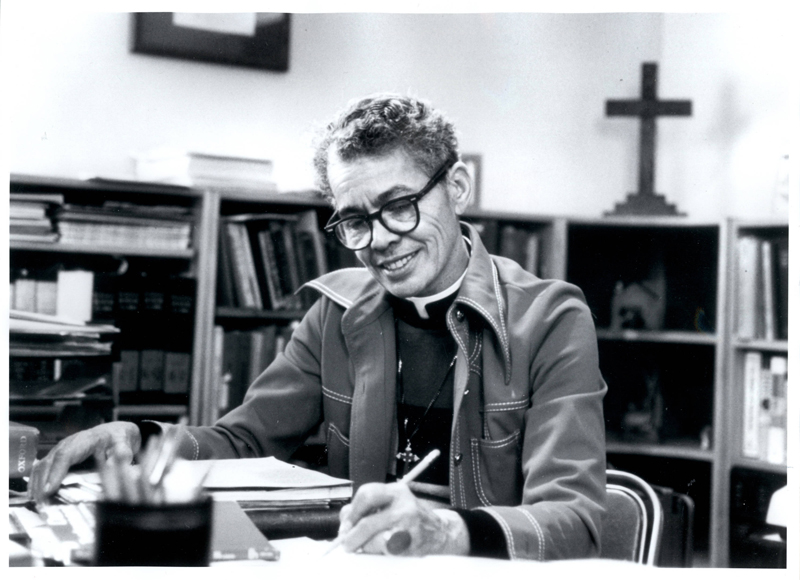A new residential college at Yale University will be named for the Rev. Dr. Anna Pauline Murray, the first African-American woman to be ordained an Episcopal priest.
RNS:
Anna Pauline Murray, known as “Pauli,” was also a civil rights activist who helped shape the legal argument for the Brown v. Board of Education Supreme Court ruling and a women’s rights activist who co-founded the National Organization for Women. She received an advanced law degree from Yale in 1965 and an honorary doctorate from Yale Divinity School in 1979.
“Pauli Murray represents the best of Yale: a preeminent intellectual inspired to lead and prepared to serve her community and her country,” Yale President Peter Salovey wrote in an email to alumni Wednesday (April 27).
Yale:
After decades on the front lines of the civil rights and women’s rights struggles—causes she considered inseparable—Murray broke yet another barrier. At the age of 63, she became the first black woman ordained as an Episcopal priest. After her ordination, she celebrated the Eucharist in the same church in North Carolina where her white slaveholding and black enslaved families had worshipped, albeit in different sections. Murray held a Bible given to her by her grandmother, born a slave, and spoke at a lectern donated in honor of her great-grand-aunt, who had owned her grandmother. Murray described her decision to join the priesthood as part of her commitment to “reconciliation as well as liberation,” in the tradition of Reverend Martin Luther King, Jr.
In 1979, at age 69, Pauli Murray was awarded an honorary doctor of divinity degree at Yale’s Commencement. In presenting this honor to her, President A. Bartlett Giamatti said, “Diligent scholar, gifted poet, respected lawyer and teacher, insistent prophet and faithful priest, you have nurtured the gifts of the spirit for the common good. You are an inspiration to those who seek the upward way for the soul and for society. Others have always followed after. Alumna at Yale in jurisprudence, Yale University takes great pleasure in awarding you the degree of Doctor of Divinity.”
In her final days, serving as a priest and ministering to people from all walks of life, Pauli Murray continued to live the credo she had articulated decades before: “I do not intend to destroy segregation by physical force. That would entail human waste and would not gain my objectives. I hope to see it destroyed by a power greater than all the robot bombs and explosives of human creation—by a power of the spirit, an appeal to the intelligence of man, a laying hold of the creative and dynamic impulses within the minds of men.”
Her words reflect the courage, love, and expansive vision of a woman who devoted her life to service and justice:
“I intend to destroy segregation by positive and embracing methods. When my brothers try to draw a circle to exclude me, I shall draw a larger circle to include them. Where they speak out for the privileges of a puny group, I shall shout for the rights of all mankind. I shall neither supplicate, threaten, nor cajole my country or her people. With humility but with pride I shall offer one small life, whether in a foxhole or in wheatfield, for whatever it is worth, to fulfill the prophesy that all men are created equal.”
The announcement comes in the midst of Yale’s decision to keep another residential college named for John C. Calhoun, a 19th-century politician and prominent slavery supporter.

